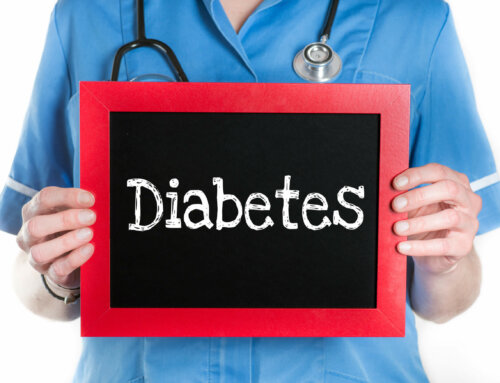Last week, we explored possible reasons why your seasonal weight gain is still sticking around. People usually gain only 2-3 pounds during the holiday season, which should be easy to get rid of after the festivities die down. Let’s look at some other possible reasons why the weight gain may be expanding or remaining stagnant.
- Portion Size – This is usually the biggest reason why weight gain does not budge. Holiday foods are eaten in larger portions and when the dust settles we should return to smaller portions. Portions have gradually increased over the last 20 years with “super sizing” becoming the normal way of eating. When I demonstrate how much a cup holds (2 servings of a carbohydrate, each being a ½ cup portion size), I get a look of confusion and amazement. Our patients are taught to eat 2-3 servings of a carbohydrate per meal (I know many of you do not eat many carbohydrates, but we still teach according to the ADA nutritional guidelines). A serving size of ½ cup of rice, noodles, potatoes, beans, peas or corn seems ridiculous to most patients. We review the “free foods”, which includes all vegetables – except for the starchy ones. These choices can be eaten in large portions without weight gain or blood sugar elevations. Patients are often surprised that they can eat any carbohydrates – but then they forget to check portion amounts. There goes the weight and blood sugar control. Even large pieces of protein – a 16 ounce steak, can do damage on your scale. Think about protein throughout the day in portion sizes as well. Have 2 ounces for breakfast, 3-4 ounces at lunch and 6 ounces at dinner. Include 1 ounce of protein plus 1 serving of a carbohydrate for a bedtime snack. Invest in a portion plate, cup measurements or Tupperware serving pieces to take the guess work out of portion sizes. Once you get comfortable with what amount you should be eating you will be able to eyeball your food quantities without the extra assistance. Keep a food journal – seeing what you eat can be enlightening and really shocking to you.
- Choose your fluids – This is a weekly conversation with my patients. All fluids with calories should be off limits for weight and diabetes control. Forget about prune juice and eat 2 prunes. It doesn’t matter if it is natural or organic juice – it still gets into your system quickly and raises blood sugars. I see patients who treat lows with glasses of fruit juice and end up sending their blood sugars too high with an immediate weight gain. If you do not like diet soda then don’t drink any soda. Stay away from power drinks, fruit smoothies (unless made by you), lemonade or fruit punch unless it is all sugar free. Stick to seltzer, sparkling water, flavored calorie free water, hot or diet ice tea, coffee, low fat milk (counted as a carbohydrate), or zero calorie drops to enhance your water or Crystal Light. Watch alcohol intake – this is empty calories and reduces your ability to make wise food choices. Drinking calories can easily add up to 3,500 calories a week – which is an easy pound gained.
Salad Bars and Buffets – The quickest way to keep weight on and gain more is to visit “all you can eat food bars and buffets”, unless you stick to the lettuce and tomatoes. Cheese, croûtons, Chinese noodles, bacon bits and heavy cream dressings are brutal for instant weight gain. Try to order off a menu for better control of choices and portions.
- Weekend binges – Many patients work hard during the week and then go crazy on the weekends which become Friday, Saturday and Sunday. This is almost half your week. You can definitely reward yourself once in a while but 3 days a week will catch up with you quickly. If you crave a sweet then knock out the other carbohydrates in that meal to help with weight and blood sugar control.
- Hypothyroidism – This indicates low thyroid function which can have an impact on your weight since it is a hormonal imbalance. People with diabetes are at higher risk for this condition. Besides weight gain, other symptoms could include being cold all the time, having very dry skin, being extremely fatigued and losing hair. Although it is much more common in women it does affect men. Talk to your doctor about blood tests including a T3, T4 and TSH level. If you already take thyroid pills, make sure you are taking the correct dosage (it can often change). Remember to take them the first thing in the morning on an empty stomach – don’t eat for 30-60 minutes afterwards.
- Sleep Apnea – A medical condition in up to 60% of people with diabetes. Since sleep is disrupted all night, people with this condition have elevated cortisol levels and quickly gain weight. Talk to your physician about a sleep study and possible treatment with a C-PAP mask.
- Watch out for daily grazing – When you do snack, decide on your snack personality and when to snack. Do you need something sweet, savory, creamy, gooey, salty, fresh or crunchy? Try to find healthy food choices that fit your tastes. Look for foods that are high in fiber, flavor and protein. Make sure they do not have refined sugars, are not processed, and watch out for flour content and preservatives. Try roasted kale chips in olive oil, apple slices with almond butter, popcorn with grated Parmesan cheese or chili powder, plain Greek yogurt with berries and walnuts, or veggie sticks with hummus or salsa. Again, plan snack times and do not pick all day since it will add up.
- Set realistic and measurable goals – Make them specific and reasonable to achieve. Realize some people have had weight issues their entire lives; keep your expectations in line. I have seen patients jump for joy over a 2 pound weight loss since they have not seen the scales move for years. They are comfortable with this pace and are appreciative to see any positive change.
- Do it with a buddy or in a group setting – Some people need to have someone to answer to which keeps them more motivated. They need company and feedback. This tends to work best in an exercise setting. Remember – even walking your dog is a buddy system.
- Eat at home – Prepare your own meals 90-95% of the time. It is important to know what is going into your food preparation for blood sugar control and weight gain. Use fresh spices and herbs along with citrus to flavor your foods. Bake, broil, steam and grill your foods. Delete cream sauces, heavy dressings and saturated fats. Restaurants are notorious at adding salt, sugar, high fructose corn syrup, cream, butter and flour to make foods tasty and rich.
These tips should help you realize why the scale may not be moving, even though the holidays are long gone. Do not give up your battle, but always remember blood sugar control is your first priority over weight loss.
NOTE: Consult your Doctor first to make sure my recommendations fit your special health needs.

 Salad Bars and Buffets – The quickest way to keep weight on and gain more is to visit “all you can eat food bars and buffets”, unless you stick to the lettuce and tomatoes. Cheese, croûtons, Chinese noodles, bacon bits and heavy cream dressings are brutal for instant weight gain. Try to order off a menu for better control of choices and portions.
Salad Bars and Buffets – The quickest way to keep weight on and gain more is to visit “all you can eat food bars and buffets”, unless you stick to the lettuce and tomatoes. Cheese, croûtons, Chinese noodles, bacon bits and heavy cream dressings are brutal for instant weight gain. Try to order off a menu for better control of choices and portions.











Leave A Comment